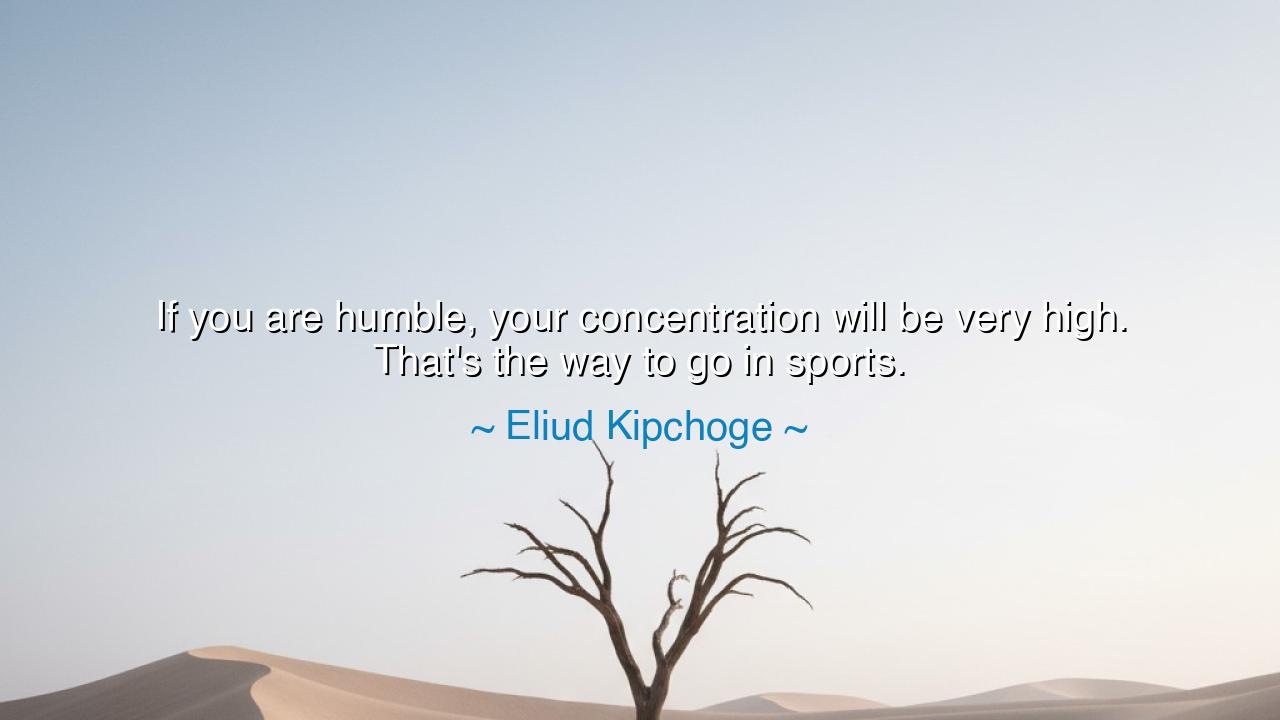
If you are humble, your concentration will be very high. That's
If you are humble, your concentration will be very high. That's the way to go in sports.






Eliud Kipchoge, the great marathoner of our age, once proclaimed: “If you are humble, your concentration will be very high. That’s the way to go in sports.” These words, though born from the discipline of running, carry the weight of timeless wisdom. For he speaks not only of sports, but of life itself—that humility is the key to focus, and focus is the key to triumph. His teaching is as steady as his stride: greatness is not born of arrogance, but of the quiet mind fixed wholly on the task.
At the heart of his wisdom lies the power of humility. The arrogant man scatters his thoughts, forever concerned with appearances, with comparison, with proving himself to others. But the humble man, freed from the burden of pride, pours all his energy into the present moment. His mind is clear, his spirit untroubled, his attention undivided. Thus his concentration rises to its highest form, and he is able to give himself fully to the race before him. Kipchoge teaches us that humility is not weakness, but the very foundation of mastery.
We see this reflected in Kipchoge’s own life. He is the man who broke the mythical barrier of the two-hour marathon, running 26.2 miles in 1:59:40, an achievement once thought impossible. Yet even in victory, he did not boast. His words were simple: “Only the disciplined in life are free.” Such humility was the shield that guarded his mind, the focus that carried him past the limits of human endurance. For it was not arrogance that sustained him through the long miles, but concentration born of quiet strength.
The ancients knew this same truth. The samurai of Japan practiced humility through ritual and discipline, believing that arrogance dulled the blade of the warrior’s spirit. The Stoics of Greece, too, taught that pride scatters the soul, but humility anchors it in clarity. Even Alexander the Great, though ruler of the world, bowed in reverence to his teacher Aristotle, knowing that without humility he would not see clearly. In every age, humility has been the gateway to focus, and focus the road to victory.
Consider also the cautionary tale of those undone by pride. In the realm of sports, champions who grew arrogant lost their edge, distracted by fame and blinded by ego. They trained less, boasted more, and in time, fell to those whose humility kept them hungry, watchful, and concentrated. Thus Kipchoge’s words are not a gentle suggestion, but a stern warning: humility is not optional—it is the very path of endurance and success.
The lesson, then, is clear: if you wish to rise in any field—whether running, learning, or leading—you must first empty yourself of pride. Approach your craft as a student, not a master. Train your mind to dwell not on glory, but on the work itself. For when you are humble, your heart will not waver, your thoughts will not scatter, and your concentration will be like a spear piercing through distraction.
So I say to you: remember Kipchoge’s teaching. Let humility be your foundation, let focus be your strength, and let discipline be your freedom. In sports and in life, do not seek to be praised, but to be present. Do not seek to be greater than others, but to be greater than your own yesterday. For when you are humble, you will see clearly, and when you see clearly, you will endure. And in endurance lies victory—not only over the race, but over yourself.






AAdministratorAdministrator
Welcome, honored guests. Please leave a comment, we will respond soon